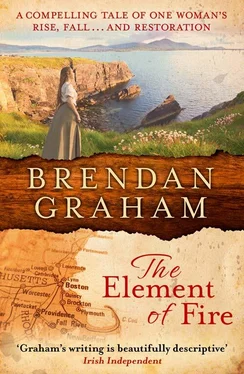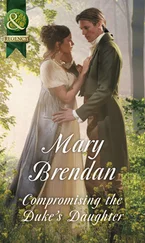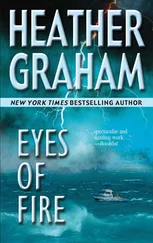Peabody, after he had thought for a moment, remarked, ‘Isn’t it a strange song to sing on your wedding-day, Ellen – a song about death?’
‘Oh no, Jacob! That’s the beauty of the song – it’s not of death, it’s of great love. He would lose God for her,’ she answered, impassioned.
Peabody looked away from her into the revelry beyond. ‘I suppose a life without great love is like that – a losing of God,’ he said. He was speaking of his own life; she waited, silent. ‘The tenacity of true passion is terrible; it will stand against the hosts of Heaven, rather than surrender its aim, and must be crushed, sent to the lowest pit, before it will ever succumb – something I heard once,’ he mumbled, by way of explanation.
‘Jacob – were you ever …?’ she started, wanting to ask him.
‘It’s something I have observed, Ellen,’ he interrupted, deflecting her, ‘about the Irish. How at once happiness and sadness can co-exist. Your wakes are laced with merriment, your weddings with lament. It is a peculiar twist of character. Little wonder the English find you a disconcerting race to govern.’ Peabody laughed a little.
‘We’re no different from any other peoples,’ she said gently, thinking of him, rather than the Irish or the English.
‘Oh, but you are, Ellen!’ he said, rising to the argument. ‘There’s a blackness within your race, a perversity. Nothing is allowed to be as it is. Love must be death. Death must be love. Everything turned on itself.’
‘Jacob, come along. This is most unlike you to be so dark, on such a day.’
He apologized, and she was drawn back into the merriment, sorry she had started it all by explaining the song to him.
She had some difficulty pulling the children away from all the excitement and settling them down across the hall from where she and Lavelle would spend their wedding-night. Later, as she undressed, thinking about the day, waiting for Lavelle, the song came back to her. ‘Úna, wasn’t it you that went between me and God?’ What a thing for a person to live with! It was unimaginable to her – throwing over God for love.
She hiked up her nightdress, knelt by the bedside. She’d shorten the prayers a bit tonight, didn’t want to be still out of bed when Lavelle came up.
Besides, Boston in springtime had yet quite a nip to it.
The very next day they moved into the new quarters Lavelle had found for them in Pleasant Street. They had decided they should rent, until they were better fitted to buy a place of their own. The fear always being with them both, that if overstretched with borrowings, things took a turn, the banks would then tumble them out of the house, evict them. She and the children already carried that scar. It was something she’d never put them through again. With the rent it was less of a risk. They’d still have a bit aside to tide them over, if a reversal of fortune came about.
She had hated leaving Washington Street, thinking how in the end it was marriage, not commerce snapping up every parcel of space which had forced them out.
The Pleasant Street house was in a neat terrace, with its own hall-door and a shiny letterbox low down – while Washington Street was never her own hall-door. A slab of granite stone stepped up to this one, which Mary thought ‘very grand’. Louisa meanwhile was fascinated by the brass lettering, running her finger around the welcoming curvature of the number that would be her new home, 29.
Inside there was a short hallway, a kitchen, a parlour and a ‘good room’, as Ellen regarded it. Upstairs three bedrooms, two commodious, one less so. ‘That one’s for you, Patrick,’ Mary couldn’t resist teasing. Out back was a small yard and a cabbage patch. It was all perfectly adequate. She could do a lot with it, and at least they wouldn’t be crowded in on top of each other.
They were hardly in the door, solid and black apart from the two light-giving panels of frosted glass, when it resounded to a vigorous knocking. On the step outside, Mrs Harriet Brophy fixed the tilt of her snug hat, pushed back an unbiddable wisp of hair and waited to present herself to her new neighbours. A trim dart of a woman from the Donegal-Derry border, she had already espied them.
‘Newlyweds,’ she had heard, ‘with three grown-up children,’ she had exclaimed to ‘himself’, hand to her mouth. ‘What’s the Christian world coming to at all, Hector?’ ‘Himself’ wasn’t much interested. ‘Bringing down the neighbourhood, that’s what. What have we got to leave our children, if not a decent neighbourhood?’
‘I’d just like to welcome you all.’ Harriet Brophy beamed as Ellen opened the door. ‘I’m your neighbour – a few doors up.’ Ellen bade in the woman, who sparrow-hopped over the threshold. She had a paper with her, something wrapped inside. ‘For luck,’ she said, ‘for the house.’ Ellen opened it. ‘A piece of anthracite to keep winters warm,’ the woman said. ‘A handful of salt, to keep the table laden.’ And in a small bluish bottle, ‘A sup of holy water to sanctify the home.’
Ellen thanked her, moved by the woman’s thought-fulness, but Harriet Brophy wouldn’t hear of it.
‘Och, for nothing at all – I think the custom came from Scotland first, except it was a sod of turf then, instead of the anthracite, and probably whiskey instead of the water!’
She had thin bony hands, Ellen noticed, which she fluttered like wings when she spoke, and a waist like a wasp. The smallest bitteen of a woman, Ellen thought, that she had ever seen. But she insisted they come with her to her house for tea.
‘Himself is out and won’t bother us!’
Ellen looked at Lavelle.
‘You and the children go, I’ll take care of things here,’ he smiled.
At tea, Mrs Brophy, as Ellen knew she would, filled her in on Pleasant Street life. ‘Nice neighbourhood, Americans and the likes of you and me,’ she confided, ‘hardworking people, none of the other Irish, you know what I mean … from the ships.’ Then, stretching her thin scrogall of a neck and leaning forward. ‘And no blacks, Mrs Lavelle.’ Harriet Brophy pursed her lips, narrowed her eyes and gave a knowing nod to Ellen. ‘You’ll be all right here, Mrs Lavelle, nice neighbours to look out for you here!’
And so it was, with Ellen settling into an ordered continuum of life with her new husband, two children and ‘the fosterling’, as Mrs Brophy referred to Louisa.
By the summer of 1849, the number of Irish in Boston had swollen to a quarter of the population, the weight by which they were arriving almost suffocating the city. Each one bringing his or her own story of the distressful state of Ireland.
Half of all the city’s paupers were Irish. Many having left the workhouses of Connacht, found only in Massachusetts the State Lunatic Asylum – alcohol and the tug of home combining to make sanity elusive. Half of the male Irish who did manage to find work were labourers. Of the females, two-thirds of all cooks, housekeepers and laundresses in Boston were Irish. Ellen marvelled at the resoluteness of her people. There was no going back and the Irish would work at anything. Boston bosses welcomed the increasing supply of green-hand drudge horses, who would work for next to nothing, $1.25 a day or less. How they kept body and soul together for this – labouring a twelve-or thirteen-hour day – she didn’t know, except it was an everyday miracle.
The Pilot carried regular letters detailing the trials and tribulations of the new arrivals:
For the promise of $2.00 a day, I was carted halfway across America. When we got there, they said it was a mistake, the most they could give was a dollar a day, with 5 cents a day gone for the first month for the cost of getting us here.
Читать дальше












